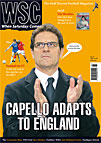 Futsal has become a professional game in some countries and improves the basic skills of players but England is still not interested, writes Jon McLeod
Futsal has become a professional game in some countries and improves the basic skills of players but England is still not interested, writes Jon McLeod
It is the game that produced Ronaldinho and Cristiano Ronaldo. Yet despite it having fostered some of the world’s finest talents with skill, ingenuity and tactical astuteness, England has neglected futsal. From its constricted origins on the streets of São Paulo and Montevideo in the 1930s, this five-a-side version of football has spread throughout Europe and the Middle East and across the rest of Asia. In 1989 FIFA confirmed it as the official small-sided form of the game and, in the internet age, players such as Brazil’s Falcão (aka Alessandro Rosa Vieira) are becoming YouTube regulars, rivalling the most flamboyant exponents of 11-a-side football.
The rules are similar to other mini formats, but for some crucial variants. The smaller, heavier ball demands sharper eyes and superior touch, and an accumulated fouls system also seeks to prevent physicality from dominating the game, allowing players to compete on the basis of ability. Although the game is played indoors, the pitch is defined by lines rather than walls and therefore requires greater skill and awareness. For Andy Roxburgh, the former Scotland coach who has been UEFA’s technical director since 1994, it is “a paradise for the technical player”.
Critics suggest the disregard of the game in England is not merely a reflection of the dearth of technically adept players – but also a root cause of that problem. Certainly futsal’s marginal status, both as a feeder for the 11-a-side game and as a separate entity, is demonstrated in the toils of the national team. In five years England have won only once in more than 50 matches. In February the team failed to qualify for this year’s world championship after enduring substantial defeats to Hungary, Poland and Macedonia. While other countries, including Belgium and Russia, select squads from professional leagues, England have been forced to pick from a disparate five-a-side club scene and non-League football – the squad for the recent match against Andorra included players from AFC Telford United, Grays Athletic and Bognor Regis.
Another blow was dealt to the ambitions of the England side when Graham Dell, who was instrumental in forming the team from scratch, resigned as coach in March. “There is some significant groundwork to be done to develop futsal further in England before a national team can be competitive and that must be where the focus now lies for everyone,” Dell told the FA’s website. He believes defeats to supposed lesser opposition such as China, Indonesia and Malaysia, who for years have had developed leagues, prove the value of those structures. “It’s a game which we are still struggling to get to grips with in England and I believe it’s the hidden and unrecognised jewel of young player development – I just wish more people could see it as quickly as we have,” he said.
The FA are hoping a new national tournament will help redress the imbalances. The FA Umbro Futsal League kicked off in March with three regional divisions. The top four clubs from North, South and Midlands leagues will contest play-offs, with the winners qualifying for the UEFA Futsal Cup. The aim is to encourage regular training and a meaningful competition from which to select the national side, as well as developing the skills of youngsters going into all forms of the game. However, there remain issues to be confronted. Clubs such as the 2006 FA Futsal Cup winners, White Bear FC, were started by foreigners settled in England and many top players remain ineligible for the national team.
The leaps forward cannot come quickly enough. As with the other strains of the game such as beach soccer, the Brazilians led the way, winning with the first three futsal world championships. However, Spain – backed by the professional División de Honor, which is one of many televised leagues in Europe – are the reigning champions, having won the title in Guatemala City in 2000 and retained it in Taiwan in 2004.
It is not just the traditional superpowers, though, that England will have to contend with: the interest in emerging football nations is frenetic. In Japan there are more than 300,000 registered players and the Nagoya Ocean club became the first professional team in their new national league when it kicked off in February. If futsal produces players for the 11-a-side game in Asia as it has done elsewhere, then the regular England national team will be in danger of being left even further behind.
From WSC 255 May 2008